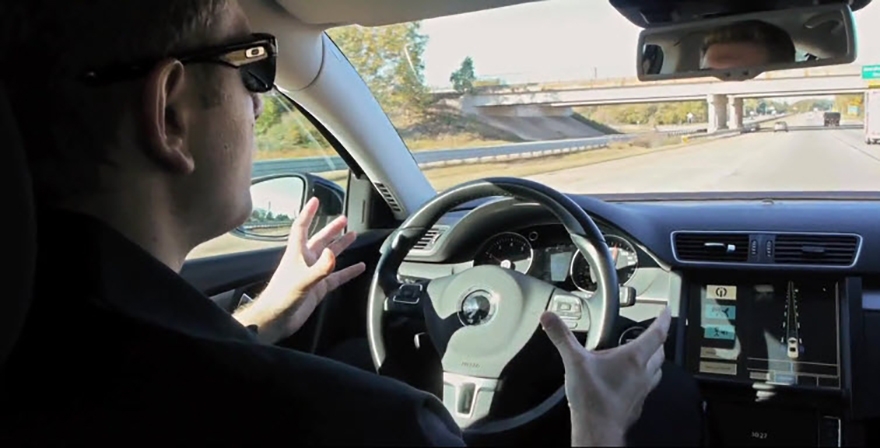Michigan looks to lead on regulation of autonomous vehicles
LANSING — In 2013, Michigan legislators adopted the state’s first laws for driverless vehicles, allowing them to share the road with live motorists only while being tested.
That legislation helped Michigan become an early leader in the race to build a self-driving car, said Mike Kowall, a state senator from Oakland County who sponsored the bills.
But for Michigan to win — especially against the tech giants of Silicon Valley, which are developing their own prototypes — he said the state also needs to lead by regulation, before a patchwork of rules crops up across state lines.
Kowall, R-White Lake Township, said he plans to introduce a bill package in the Senate that would allow autonomous vehicles on Michigan roads for any reason, not just during testing.
A set of bills introduced last week would make it illegal to hack into connected vehicle systems. The bills would make that a felony that could land an offender in prison for life. The rest of the package, which Kowall said is expected to follow soon, would establish liability insurance requirements for connected equipment manufacturers in case their products malfunction, and formally authorize use of the former General Motors Co. powertrain plant at Willow Run Airport near Ypsilanti for the new American Center for Mobility project.
“Michigan is the home of the automobile,” said Kowall, who hopes Michigan’s standards could be incorporated into federal rules. “If our guys are saying, ‘Yep, that’s going to work,’ that’s the same thing they’re going to be telling the feds.”
“This is all brand-new territory that we’re delving into.”
> CLICK HERE TO MAKE A DONATION TODAY!Attorneys who specialize in connected car technology and autonomous vehicles say the industry is creating new and unique legal issues around everything from cybersecurity and data protection to product liability.
Driverless cars aren’t available to buy yet, though the Alliance of Automobile Manufacturers, a Washington, D.C.-based coalition of 12 automakers, including the Detroit 3, said its members intend to bring them to market “as soon as possible.”
Some estimates suggest it could be a matter of years before they’re on the road.
Automakers are getting involved in setting the regulations that ultimately will govern their efforts. Kowall said the automakers’ alliance has participated in discussions about specific language in his forthcoming bills.
The alliance says its members are investing in automated technology in an effort to increase vehicle safety and reduce crashes. But the group cautioned against adopting too many rules too early, before state and federal regulators can develop common standards for autonomous vehicles.
“The Alliance urges federal and state governments to aid in facilitating the introduction of these technologies,” it said in a statement.
“Establishing premature certification requirements, test procedures and performance criteria, dictating technology-specific approaches or adopting a patchwork of ill-timed competing state rules would only inhibit vehicle innovation and limit these important life-saving safety improvements.”
State vs. federal regulations
Michigan is one of just seven states with any laws on the books regulating autonomous vehicles.
But its status as one of the few in the game may be waning. The number of states introducing bills has grown steadily in recent years, from six in 2012 to 16 last year, according to the National Conference of State Legislatures.
Nevada was first in 2011; since then, California, Florida, North Dakota, Tennessee, Utah and Washington, D.C., also have followed Nevada’s lead. Arizona Gov. Doug Ducey last year signed an executive order directing state agencies to support testing of autonomous vehicles and set up pilot programs at universities.
Michigan Gov. Rick Snyder signed two bills in 2013 that allowed autonomous vehicles on streets and highways only for testing purposes and exempted auto manufacturers from liability for damages that result if someone modifies a vehicle to make it autonomous.
Wanting to avoid varying state laws, the federal government is developing its own standards for automated vehicles. The National Highway Traffic Safety Administration in January said it planned to issue guidelines within six months about safe operation of self-driving vehicles and will work with states on model policies to create a “nationally consistent approach to autonomous vehicles.”
The agency recently accepted public comments to help it shape forthcoming guidelines for carmakers and vehicle equipment manufacturers to determine when a technology flaw or malfunction might be considered a safety defect.
“When would we consider vulnerability to a cyberattack to be a defect?” said Paul Laurenza, an attorney and managing member of Dykema Gossett PLLC’s Washington, D.C., office, who works on auto regulatory issues. “That is an area that certainly we wouldn’t have been talking about as a potential recall three or four years ago.”
Laurenza also is chairman of the Connected Vehicle Trade Association, a Plymouth-based organization that represents companies, governments and other entities working on connected vehicle technology.
Historically, he said, states’ vehicle regulations typically focus on driver licensing and vehicle use, because federal safety standards would preempt any set at the state level.
States that regulate beyond how vehicles are used risk contributing to a patchwork of rules, Laurenza said. That could impede federal regulators’ ability to ensure safety, he said, as well as manufacturers' development of autonomous vehicle technology.
Michigan an industry leader?
Kowall said he hopes Michigan will serve as a model for other states and federal transportation officials navigating the new regulatory and legal issues surrounding driverless vehicles.
The state already is attempting to lead the nation in research and development of automated vehicle technology and mobility. The University of Michigan last year opened a 32-acre test site on its north campus called Mcity, a city simulation that allows for controlled testing of self-driving vehicles in scenarios that range from freeways to traffic circles.
The state, through the Michigan Economic Development Corp. and Michigan Strategic Fund, is a partner in the American Center for Mobility at Willow Run, a former bomber factory during World War II. The 335-acre site will act as a test track.
More recently, a diverse group of companies — automakers Ford Motor Co. and Volvo, tech titan Google Inc., and ride-sharing services Lyft and Uber — joined forces to advocate for public policy regarding self-driving vehicles.
The risk for states wanting to legislate an industry that is still largely conceptual is a lack of uniformity, said Jennifer Dukarski, an attorney with the connected car and autonomous vehicles team for the Butzel Long law firm in Ann Arbor.
As an example, she described a scenario in which a connected or autonomous car traveling between Michigan and Ohio might find different requirements for opting out of data collection just by crossing the state line.
“It’ll create a hodgepodge, but in the interim it makes perfect sense until we get some federal legislation,” she said. “If they want to play in the space, (states are) going to have to come to some sort of agreement of what the rules of the road are.”
The wide-open regulatory environment is posing other challenges, attorneys said.
States such as Michigan are discussing product liability requirements for the makers of connected vehicle equipment, such as lane collision avoidance, blind spot and emergency braking technology, in the event the parts malfunction. And wireless vehicle-to-vehicle connectivity might require automakers to deal with federal telecommunications regulations.
“That’s what makes it a novel practice — that (it) has to be very cross-disciplined in a way that we never thought about in a vehicle,” Dukarski said. “If a widget breaks, it’s harder to tell what line of code when there’s hundreds of millions of lines of code.”
Regulators such as NHTSA are likely to want automakers to voluntarily agree to follow specific rules and standards because the federal rulemaking process could take years, Laurenza said.
That likely won't be fast enough for the industry. Kowall said his goal, especially with his proposed bill to allow autonomous vehicles on Michigan roads for any reason, is to attract new driverless car R&D to the state.
“Everybody’s trying to pick our pockets when it comes to the auto industry,” he said. “We have to make sure that what we do, other states are going to follow suit at some point, because this is going to be an integrated system that eventually is going to go nationwide.”
See what new members are saying about why they donated to Bridge Michigan:
- “In order for this information to be accurate and unbiased it must be underwritten by its readers, not by special interests.” - Larry S.
- “Not many other media sources report on the topics Bridge does.” - Susan B.
- “Your journalism is outstanding and rare these days.” - Mark S.
If you want to ensure the future of nonpartisan, nonprofit Michigan journalism, please become a member today. You, too, will be asked why you donated and maybe we'll feature your quote next time!


 A semi-autonomous car designed by Continental Automotive Systems USA in Auburn Hills. State lawmakers want to regulate the use of self-driving vehicles as the industry grows. (Bridge/Crain’s photo by Dustin Walsh)
A semi-autonomous car designed by Continental Automotive Systems USA in Auburn Hills. State lawmakers want to regulate the use of self-driving vehicles as the industry grows. (Bridge/Crain’s photo by Dustin Walsh)